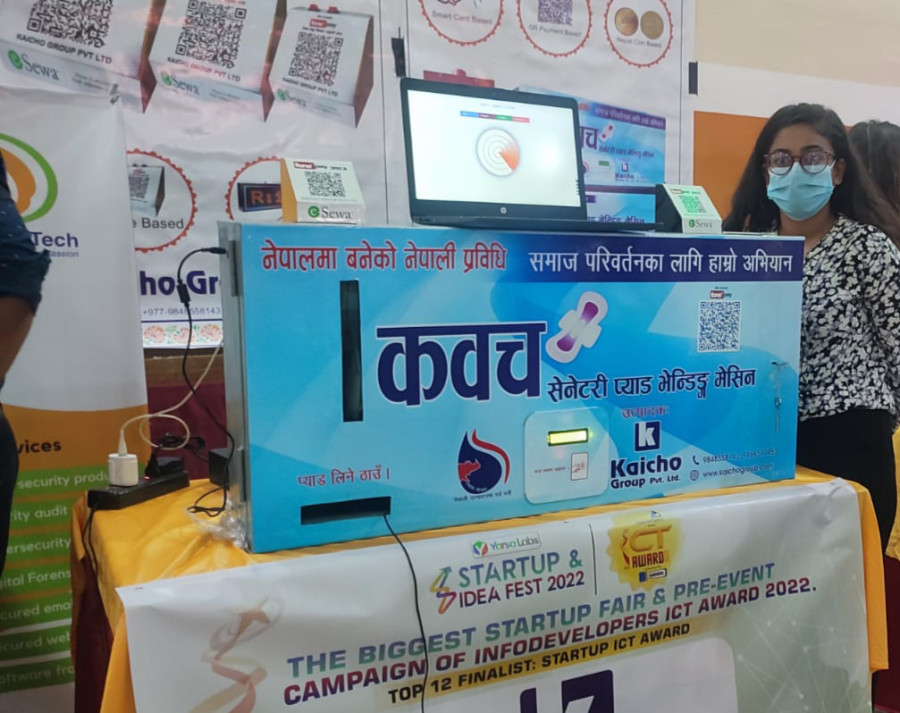Money
Sanitary pad vending machines help to keep girls in school
Local units, social organisations and schools are the largest buyers of the vending machines, the manufacturer says.
Pawan Pandey
A group of engineering graduates formed a company to manufacture sanitary pad vending machines so shy girls who wouldn't visit a store could get them easily.
The machines, according to the engineering graduates, if produced commercially can contribute to easy accessibility of sanitary pads at various places during period emergencies.
Local units, social organisations and schools are the largest buyers of the vending machines, says Suman Paudel who got his friends together to start the company.
Paudel from Kailali district in far western Nepal had been intrigued by machines from his school days. After 10th grade, he decided to follow his passion, and enrolled at Bheri Technical School to do a Diploma in Engineering course.
The school in Nepalgunj, Banke district is affiliated to the Council for Technical Education and Vocational Training (CTEVT).
“We formed a group among our classmates to discuss creative ideas while we were in Nepalgunj. We named the forum Kaicho,” said Paudel. A decade later, he registered Kaicho Group as a company in Rupandehi district.
“The reason for choosing Rupandehi as our base is that it is close to the Nepal-India border, which makes it easy to get the required materials in the Indian town of Rupaidiha,” co-founder and chairman Paudel told the Post.
Two years ago, the group launched Kawach, a sanitary pad vending machine. According to Paudel, they have sold 722 units of different sizes so far.
“Besides the core team which consists of 10 members, 30 other individuals from across the country are associated with the company,” said Paudel.
The smallest model of their vending machine can be loaded with 50 to 100 pads at a time, and the biggest model can hold 550 pads.
The machines can be loaded with every kind of pads available in the market, according to its manufacturers. Kaicho has collaborated with a domestic sanitary pad producing company to purchase their products at bulk rates.
The company offers two types of vending machines—one which takes tokens and the other which takes cards. The tokens are made by the group.
“The mechanical vending machine which takes tokens does not require electricity to run,” Paudel said. “It can be loaded with 50 pads.”
The second model is a radio frequency identification (RFID) card-based machine. “The company provides the cards along with the machine,” said Paudel.
“The number of pads that can be withdrawn at a time can be set in the card by the customers themselves. Most of the private schools have bought card-based machines," he said.
“The market price of the smallest vending machine has been fixed at Rs30,000, and the largest one costs Rs450,000,” said Paudel.
The company is able to provide the smallest vending machines at a lower price as they have been subsidised by a non-governmental organisation.
“We sell the smallest vending machine for Rs12,500,” said Paudel. “Samaj Ka Lagi Yuwa, a Dhangadhi-based non governmental organisation, has sponsored us for 1,000 vending machines. The organisation covers the rest of the cost.”
Smriti Kattel, advisor to the group, said the idea of developing a sanitary pad vending machine first came to their minds two years ago when they were participating in Idea Studio Season 5.
They exhibited Pothi, a hatchery machine for poultry businesses, at the competition. “We were declared winners in the Made in Nepal category,” said Paudel.
“The vending machines can help girl students since many schools still do not keep sanitary pads; and even if the pads are available, girls may hesitate to ask for them because of menstruation-related taboos,” said Kattel.
There have been reports of girls skipping classes for four to five days during their menstruation due to lack of access to sanitary pads at school.
In recent years, many schools have installed sanitary pad vending machines to enable students to attend classes during their period.
On May 4, 2019, President Bidya Devi Bhandari had announced that free sanitary pads would be distributed to girl students of all community schools from the beginning of the fiscal year 2019-20.
The federal government had allocated Rs1.37 billion in the 2019-20 budget for community school sanitary pad distribution projects in all 753 local units across the country.
The objective of the programme was to improve the school attendance rate of girl students.
A 2016 UNICEF report showed that 15 to 22 percent of girl students in schools in Achham, Bajura and Parsa districts were missing a whole day of school due to menstrual discomfort, both physical and mental.
“Though the government provides sanitary pads to community schools, there exists hassles in distribution because of taboos surrounding menstruation,” said Kattel.
The group carried out a market study which concluded that manufacturing sanitary pad vending machines could not only be a social service but a profitable business as well.
“Most of the feedback we have received for our product have been positive,” said Kattel and Paudel. However, like every start-up, the group has encountered some hurdles.
“Our biggest clients are local governments followed by organisations running social awareness campaigns,” said Paudel. “More private schools than community schools have bought the machines.”
Paudel believes the vending machines can be beneficial to individuals involved in the sanitary pads business or social awareness groups.
“Since customers can pay for the pads through Fonepay, one can set up several vending machines at different places,” said Paudel. “The vending machines are open 24 hours.”
Kattel believes the government can buy more of their product in the coming days. “The vending machines can be set up at airports, bus parks, restaurants and other places,” she said.
“Distribution and delivery is the biggest issue we have faced so far. Despite increasing demand, the cost of delivering the machines in mountain districts is high,” said Paudel.
Developing an easy payment system has been a challenge.
“Since only Rs1 and Rs2 coins are in circulation in the market, it is not practical to use them in the vending machines,” said Paudel.
“Many people may not have smartphones, and not all places have the internet to use the digital payment system. And to enable the machines to accept banknotes, you have to install a device which is very expensive,” Paudel said.
Kaicho aims to upgrade the sanitary pad vending machines with new technologies in the coming days, and also expand the inventory to contraceptives and pregnancy test kits.
Kaicho was placed in the top 12 under the Start-up category for this year’s ICT Awards for its sanitary pad vending machines.
Organised by Living with ICT, a tech-related magazine, the award honours innovation and start-ups in the digital sector annually.
“The aim of the ICT Awards is to discover creative ideas and innovation in the digital sector from all across the country, and provide them a platform to promote their ideas, find investors and clients, and eventually turn them into a profitable business,” said Rajan Lamsal, founder and chairman of Living with ICT.
“The top 12 finalists in different categories will be filtered to select the top 5 based on the evaluation of a 13-member jury and public voting. The final event of the seventh edition of the annual awards will be held on December 23," said Lamsal.




 9.89°C Kathmandu
9.89°C Kathmandu















